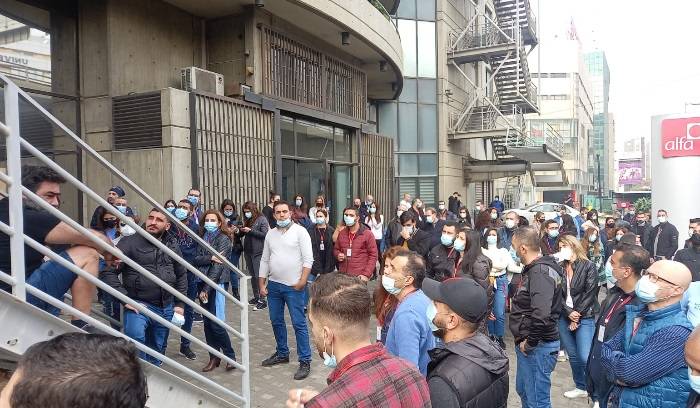
Employees of Alfa and Touch gathered on the occasion of an open strike in 2021. (Credit: NNA)
BEIRUT — The Syndicate of Workers and Employees of Companies Operating the Telecom Sector in Lebanon announced Thursday evening that they will hold a strike and a sit-in Friday to protest "political clientelism and subordination in promotions and incentive distribution," the state-run National News Agency reported.
The syndicate said the "warning sit-in" will take place in front of the state-owned telecommunications companies, Alfa and Touch, from 11 a.m. until 3 p.m.
The syndicate added that it found itself forced to take such measures in light of "political clientelism and subordination in promotions and incentives distribution" at the telecom companies, "which discriminate between employees within the same department and the same company."
The companies' employees also said that they attempted to "reach solutions by communicating with those who are concerned and responsible," but that, after the adoption of the budget law, salaries soared while some employees "were deprived of [their rights]."
In a statement released later Thursday, caretaker Telecommunication Minister Johnny Corm denied any political clientelism at Lebanon's Telecoms companies and said that he "considers the syndicate's move to be completely unjustified," according to the NNA.
Corm also explained that the syndicate had submitted a request "to increase salaries and increase the salaries' percentage of 'fresh' dollars," which he said is inconvenient to carry out "at this difficult stage that the country is going through," adding that the salary boost "will take place once it is possible to do so."
In August, Ogero employees started an open-ended strike that lasted for more than two weeks, demanding better wages and improved working conditions for employees. After former President Michel Aoun signed two decrees related to telecoms' workers' rights, employees announced the end of the strike.
Telecoms services have been undergoing a series of complications and malfunctions in several areas across the country, most notably through power outages and the unavailability of diesel fuel for backup generators at certain power stations. This has affected the quality of communications and internet services, which have faced sporadic and long-lasting disruptions.